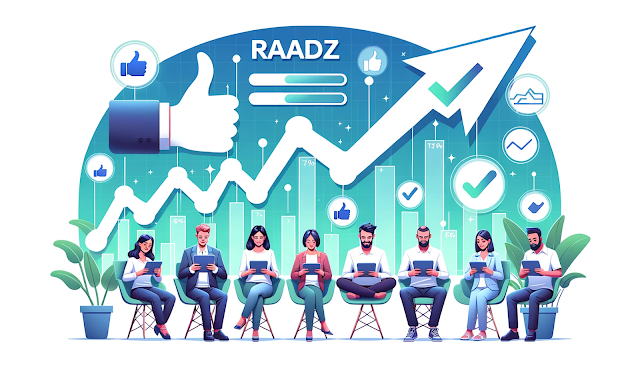The Art of Prediction: How RAADZ's Unique Approach Uncovers Truthful Insights
In a world that's inundated with an overflow of surveys and polls, it's become somewhat of a Herculean task to extract genuine, accurate insights. Traditional survey methods, while widely adopted, are subject to a host of issues like the tendency for respondents to answer more socially desirable, biased responses, or the fear of facing backlash. This is why we at RAADZ took the initiative to chart a new course – one that utilizes the untapped power of prediction to bring forth the truth.
RAADZ, at its essence, is not merely a survey tool. We've built it as an innovative platform that combines patented technology and the concept of gamification to incentivize honest, thoughtful survey responses. This breaks away from the traditional survey mold and addresses many of the inherent limitations that conventional methods pose.
The Power of Prediction
The unique edge of RAADZ lies in its predictive survey methodology. Instead of simply asking respondents to give their opinions or answers, RAADZ prompts them to predict the average response from all respondents. This methodology puts the false consensus effect into play - a psychological phenomenon where individuals project their own beliefs, opinions, and values onto the majority.
Now, you might be wondering, "How does prediction garner more honest responses?" The secret is in the cognitive process that prediction induces. When asked to predict the average answer, respondents are nudged to think more deeply about the question, contemplate diverse viewpoints, and then tender their answer. This process draws out their comprehension of societal norms and their perception of the world, uncovering their true opinions as they're likely to project their beliefs onto the average respondent.
The Gamification Element
A vital part of RAADZ's methodology is the integration of gamification. Respondents are ranked based on the accuracy of their predictions, and rewards are allocated according to their rank. This element of game design not only makes the survey-taking process more interactive but also nudges respondents to give more accurate and well-considered answers.
Applying game-design elements in non-gaming contexts has proven to enhance motivation and engagement. By introducing this into our survey platform, we're ensuring that respondents stay engaged throughout the process, reducing the chances of lackadaisical or indifferent responses, a prevalent issue in traditional surveys.
Combating Fear of Backlash
An inherent problem with traditional survey methods is the potential fear of backlash for expressing potentially controversial opinions. This fear can lead to dishonest or skewed responses, rendering the collected data unreliable. However, by asking respondents to predict average answers, RAADZ cleverly sidesteps this issue. Respondents can comfortably express their honest opinions under the guise of prediction, minimizing the fear of backlash.
Incentivizing Honest Opinions
RAADZ's strategy of rewarding respondents based on the accuracy of their predictions provides an incentive for honesty. Respondents are propelled to give accurate predictions, which align with their honest opinions due to the false consensus effect. This incentive system, when paired with the gamification aspect, fosters thoughtful, truthful answers, enhancing the quality of collected data.
Conclusion
The traditional survey landscape, riddled with issues like biased responses and dishonest answers, was crying out for a revolution. RAADZ, with its innovative, prediction-centric approach, has breathed new life into the domain of market research. We've harnessed the power of prediction, gamification, and well-placed incentives to create a platform that encourages more truthful, thoughtful, and accurate survey responses.
#MarketResearch #SurveyMethods #DataAnalysis #Gamification #Innovation




Comments
Post a Comment